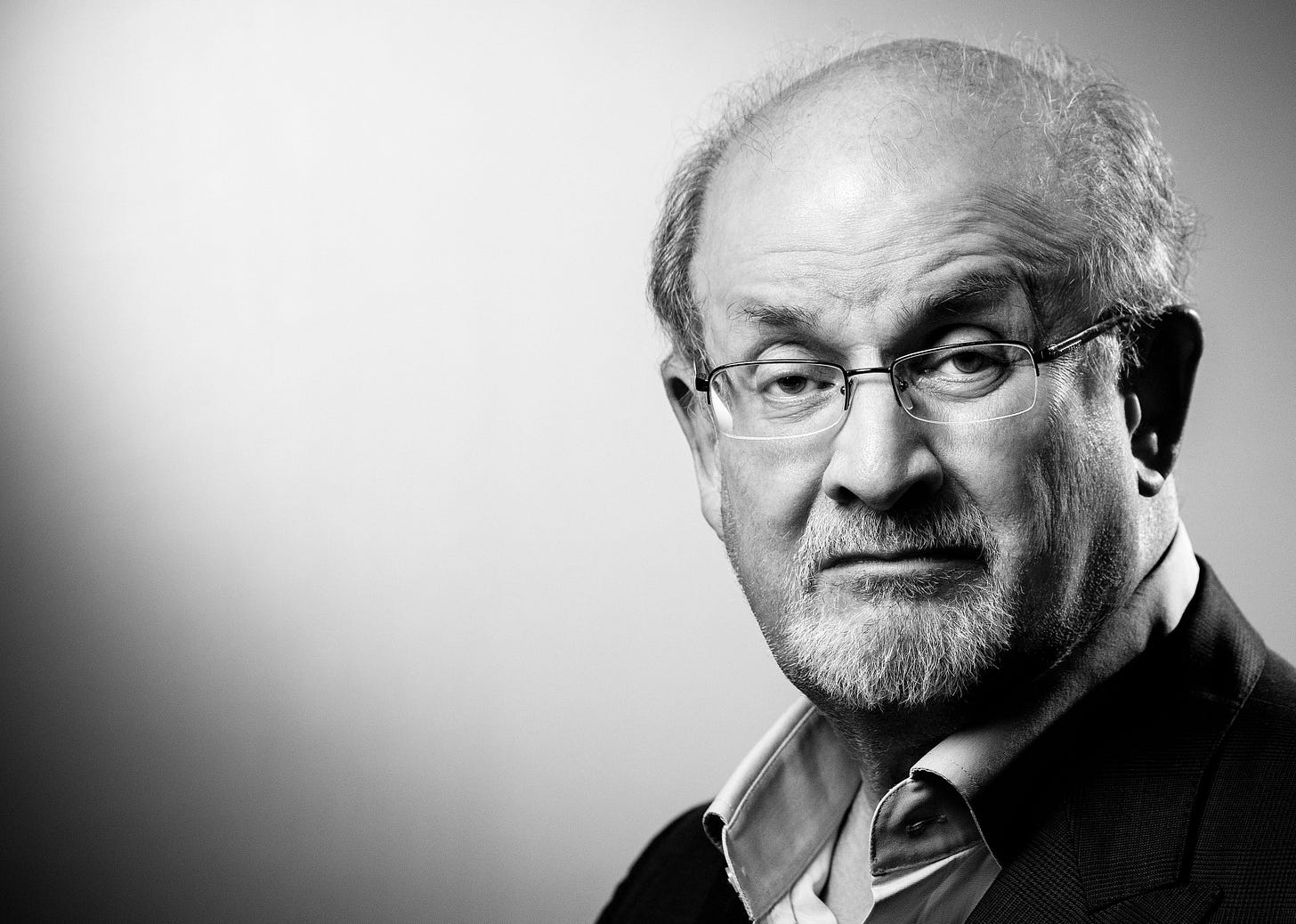Standing with Salman
Some notes on the response to the Rushdie attack
There has been widespread and unequivocal support for Salman Rushdie as he recovers from the attempt on his life. It has been heartening to see. Since Ayatollah Khomeini issued the fatwa calling for the writer’s death in 1989, the support in the Western literary and cultural establishment has too often been tentative or ambivalent. Though organizations like PEN expressed solidarity, we mustn’t forget how many prominent figures—President Jimmy Carter, John Le Carre, Roald Dahl, the then Archbishop of Canterbury, to name a few—utterly disgraced themselves bemoaning Rushdie’s “blasphemy” even as he received credible and ongoing death threats. This was also the sort of sentiment wheeled out by idiotic leftists in the wake of the Charlie Hebdo attacks. It was too ghoulish to openly say “they had it coming,” so what was offered was something like “well, obviously I don’t condone violence, but they were being very offensive to Islam.” Such arguments always deploy what the German-Turkish journalist Deniz Yücel calls the “mendacious, shitty ‘but.’” It happened a lot in the War on Terror years. Because jihadists were functionally anti-imperialists, this meant their actions, while not necessarily endorsed, could be politically rationalized. Leftist commentators are notorious for spinning such barbarism into “West bad” narratives even before the blood of innocents has dried. Apologia for random, terroristic violence is horrible enough, but there’s something perversely suicidal about writers and intellectuals who diminish threats to one of their own. For all his faults, Christopher Hitchens was one of a few high-profile individuals who was consistent, principled, and outspoken about the Rushdie affair from the jump.
Right now on social media, people (including many in the literary world) are a lot more bolshy and Hitchensian in their defence of Rushdie. Maybe that’s got to do with the severity of the attack. Perhaps the threat seemed more theoretical in the past, even if the fatwa did lead to the murder of a Japanese translator in 1991, several bookstore firebombings, and a few failed assassinations of both Rushdie and publishing collaborators throughout the years. In the wake of the recent attempt on his life, people are “standing with Salman,” reading his work aloud in public spaces and online. The ambivalence and tentativeness have vanished.
Rushdie was not just a victim of a theocrat, but of a time. Just one year before The Satanic Verses burst into global notoriety, the philosopher Allan Bloom published The Closing of the American Mind, a book critiquing academia’s embrace of relativism as a key virtue. This polemic kicked off a series of debates about university education and its influence on society: hate versus free speech, affirmative action, identity politics, what should be in the Western canon or whether there should be a canon, and so forth. These topics are still common in the culture war, especially now that social media churn periodically dredges them back up to the surface. Few in the academy and intelligentsia sided with Bloom. Instead, they suggested his respect for tradition and rigor and his anti-relativist stance were outmoded and conservative. Bloom skewered the habits of thought (that weren’t really thought at all) which made so many public figures so mealy-mouthed when it came to the Rushdie affair. To defend Rushdie was automatically to critique a foreign leader of a foreign religion, and such a stance was anathema to the cultural relativist orthodoxy of the time. The backlash to political correctness in the late 1990s came too late. Perhaps if it had happened sooner, the defence of Rushdie’s free expression wouldn’t have been so circumspect.
Of course, it wasn’t just political correctness. The reticence of many writers, including Arthur Miller, to speak out, was often chalked up to fear. At first, the cynical part of me thought Standing with Salman was only really happening now because Islamic extremism isn’t so much in the air anymore. If this recent attack happened just five or six years ago when jihadists were butchering innocent people all over Europe, there wouldn’t be this outpouring of support for Rushdie in the West, I thought. As ISIS disappeared and lone wolf Islamists faded from the media cycle to be replaced with various other Current Things, people had conveniently found some courage, it seemed.
But what’s more likely is that the Standing with Salman phenomenon is part of a cycle that we’ve seen before. Just as the mid-1990s saw a backlash to political correctness (in literature, movies, comedy etc), the early 2020s are seeing a backlash to its mutant offspring, wokeism. Politically, this backlash is overt, especially in the US where the second Trump administration has worked to legislatively contain the excesses of DEI and other left-wing absurdities within the institutions. However, in the sphere of art and culture, this backlash is more subcultural. This might be because the new political correctness has an institutional stranglehold that the old political correctness never had. But the forceful, unqualified, and highly visible support for Rushdie seemed like a signal event, perhaps even a turning point.
The cultural malaise of the long 2010s may finally be coming to an end, but the fatwa isn’t going anywhere. Evidently, this event has stirred more people into taking free expression seriously. No more mendacious, shitty buts. It is always risky to publicly advocate for it, but riskier to let free speech disappear. Because if your dreamers are dead and your thinkers are gagged, your civilization will no longer stand.


